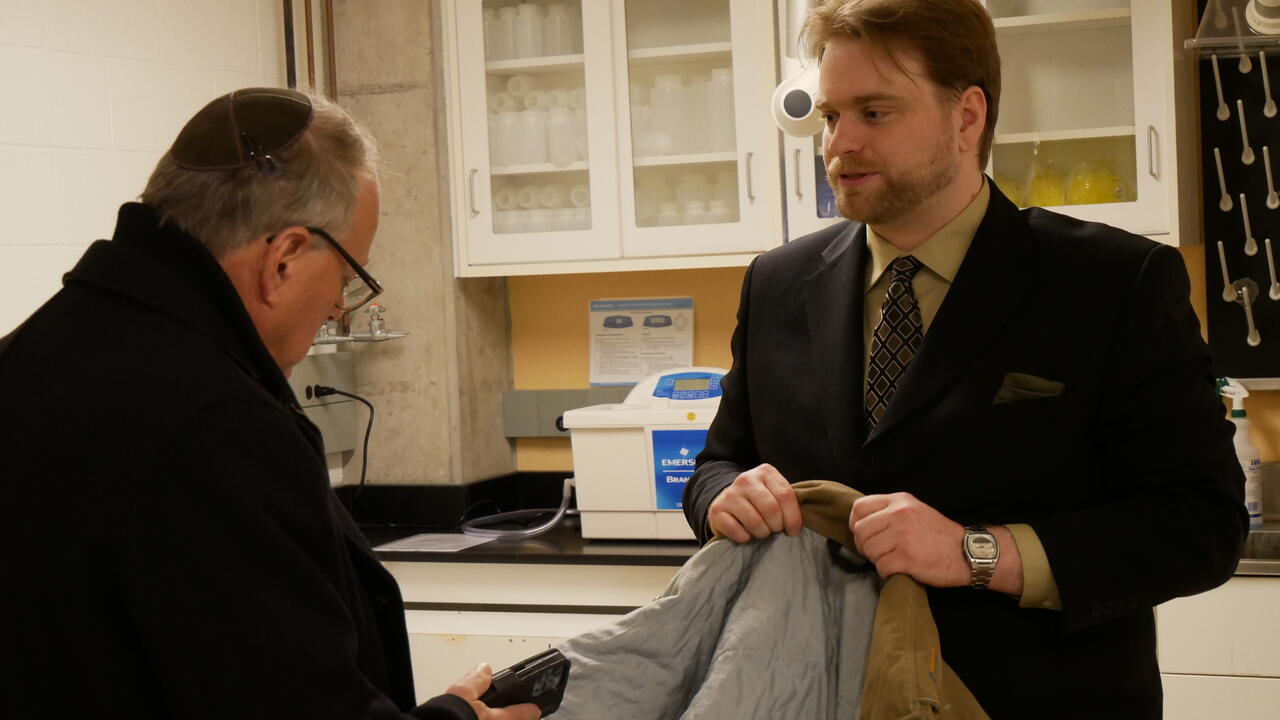Recent studies have suggested that firefighters are three times more likely to die of cancer than the general population. This is partly attributed to their gear, which contains polyfluorinated substances (PFAS), a large group of chemicals that are used in many applications, and often elevates the risk to cancer.
To reduce this health risk, chemical engineering graduate student Drew Davidson is working to develop novel material to create firefighting gear that will not degrade and cause occupational cancer. His research is inspired by his mother who has been a firefighter in the Cambridge Fire Department for 32 years and asked if in his engineering background there was anything he could do to help resolve this important health issue.
As Davidson's research has gained momentum, Ontario's Solicitor General, the Honourable Michael Kerzner, who is responsible for policing and public safety, paid a recent visit to Waterloo's department of Chemical Engineering.

Drew Davidson with Solicitor General Michael Kerzner looking at his mom's jacket.
"It was great to be here today because we care a lot about our firefighters and their well-being," Kerzner said. "What I saw today was really exemplary. This is why we must look to the sciences and innovations of tomorrow to keep our firefighters safe. These researchers are looking at ways to make the fabric that goes in the outerwear that firefighters wear safer in the future. I'm proud of the research that's being done here."
PFAS have unique properties, which make them difficult to replace, and are used in the critical fireproofing and fire extinguishing materials used by firefighters. They do not degrade in the environment and transform into microplastic pollution over time. PFAS can diffuse through the skin of fire suits and accumulate in organs which increases the risk of cancer.
This is why Davidson's innovative research has earned him a new Deep Tech Scholarship - the first of its kind in Canada that was recently launched by Mary Wells, dean in the Faculty of Engineering.
The idea behind the scholarship came from chemical engineering professor Valerie Ward who recalls many graduate students approaching her for advice regarding launching start-ups.
Recipients of the scholarship will be equipped with skills to scale up the technology developed during their PhD and create a company after graduation.
"My idea is to let students have the freedom to work on research that they are passionate about during their PhD and find them an advisor who is also interested in seeing the impact of the research outside of the university," Ward says.

From left to right is: Dr. Marc Aucoin, chair of the Department of Chemical Engineering, Dr. Valerie Ward, Solicitor General Michael Kerzner, Drew Davidson, Dr. Milad Kamkar and Kade Truman
Davidson's PhD research will be supervised by Dr. Milad Kamkar, director of the Multiscale Materials Design Lab, who has expertise in polymer engineering and the synthesis of advanced, sustainable, biobased nanomaterials.
"We will take an interdisciplinary approach by working at the interface of engineering, chemistry, advanced processing and synthesis to develop a novel product surpassing the properties of PFAS," Kamkar says. "We are hopeful to address this concern and develop a versatile substitute."
The development of an alternative material will also help alleviate the detrimental effects of PFAS on the environment.
Davidson has already teamed up with MBET graduate Kade Truman, who brings a unique background in entrepreneurship and commercialization of deep tech to the project. Together, they aim to utilize the skills they've developed at Waterloo to make a positive impact on the lives of Canadian firefighters.






